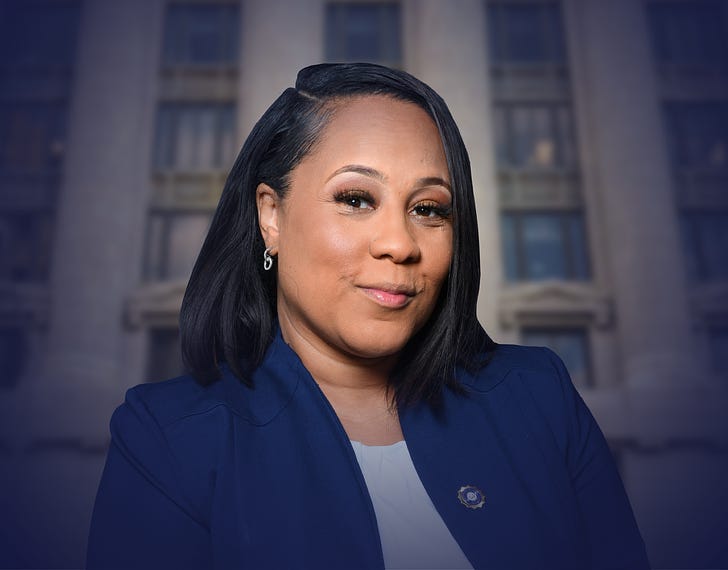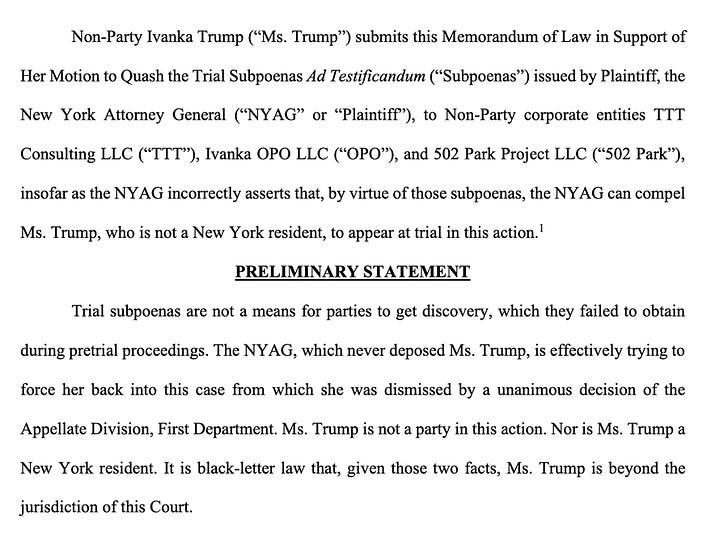Tonight, instead of the explainer I’d planned on jury selection in Fulton County, Georgia, in the week ahead, we’re looking at a very different legal landscape. Two defendants in that case have now acknowledged their guilt and are obligated to testify. Fani Willis knows the substance of their testimony, but it is not public yet. The most important pending question in Georgia is, when does the next trial get set, and will it include all of the remaining defendants?

A September 14 scheduling order sheds a little light on that matter. It applies to all defendants other than Powell and Chesebro and orders the parties to complete initial discovery by October 6. We are well past that deadline. The Judge also gave the parties until December 1, just a bit more than a month away, to file all motions other than motions in limine. That means substantive motions, like defendants seeking to sever their trials from co-defendants or substantive motions claiming some form of immunity, are all due by that date. (Motions in limine, which are filed shortly in advance of trial, typically have more to do with evidence that will be admitted or excluded at trial). So, the Judge has set tight deadlines for any “big” motions parties may wish to file on legal or other substantive matters.
The September order doesn’t set a hearing date for any of those motions. Presumably the Judge will set them once the motions are in. That leaves hanging the question of the trial date he intends to set. Fani Willis could leave it up to the Judge to rule, but look for her to file a motion this week asking him to set that date. Remember, Willis was willing to try all of the defendants October 3. She’s ready to go.
But the civil fraud case that’s likely to put Trump out of the real estate business in New York is still ongoing, and not expected to finish up until just before Christmas. Because it’s a civil trial, Trump is not required to be in the courtroom, and his participation has been sporadic, or perhaps to put it more accurately, performative. In fact, there is little on his legal calendar that requires his attendance between now and March 4, when Jack Smith’s case in Washington, D.C. is currently set for trial if all goes according to plan. Round two of E. Jean Carroll’s lawsuit against Trump goes to trial on January 16, but again, it’s a civil case and he didn’t attend the first one. That means there are a couple of open months for a trial.
Trump’s political dance card is an entirely different matter, with the Iowa Republican caucuses on January 16. But plenty of defendants have attendance at their day job suspended during a criminal trial, and although all of the judges are likely to do what they can to avoid the appearance of interference in the political process, the government, like Trump, is entitled to a speedy trial. Judge McAfee could set a January trial date to get his case underway before the other three are scheduled, but it’s a tight squeeze. However, if he does not, it’s very unlikely Trump’s trial in Fulton County will happen before the outcome of the Republican primary process is decided. Assuming there are no cascading delays in the existing trial schedules, the Manhattan DA’s trial on charges related to documents fraud and the payments to Stormy Daniels is set to begin on March 25, 2024 and the Mar-a-Lago case is currently set for May 20, 2024. Even if everything stayed on schedule and the Manhattan case wrapped up quickly, with an estimate of four months to try the case, the Fulton County trial wouldn’t be complete before the Republican nominating convention in July.
In some sense, it may be that only the first case to go to trial will matter in the political sphere. If Trump is convicted, we will learn whether that influences Republican voters. If he is acquitted, Trump will embrace the witch hunt motif for his campaign even more tightly. But the people are entitled to justice in these cases, and it would make sense for Judge McAfee to schedule his case expeditiously, particularly since the existing schedule suggests it will be close to ready by the first of the year.
One final caveat—Trump may yet throw a big monkey wrench into the works if he loses in the trial court on constitutional-type motions that can be immediately appealed. As we’ve discussed, scheduling would then rest on how quickly the appellate courts are prepared to act. So we move forward with lots of known-unknowns, but also with the four months that would have been carved out of the schedule in Fulton County for Powell and Chesebro back in play. Trump may face justice in Georgia sooner than he expected to. But it’s going to be hard to fit all of these trials in, and Trump is sure to complain about both political interference and violation of his rights to adequate preparation time; both are issues all judges will have to take seriously to protect the integrity of any convictions on appeal.
We’re also awaiting rulings in a trio of Trump-related matters in other cases.
Mar-a-Lago: Last Friday, the Garcia hearing on lawyer conflicts of interest finally got underway for Walt Nauta. Originally scheduled for October 12, that hearing blew up when the government raised additional conflicts and the Judge insisted on more briefing and a delay. One of the government’s key witnesses is Nauta’s lawyer Stan Woodward’s former client, Yuscil Taveras, who decided to cooperate with the government after receiving advice from independent counsel. Woodward now says that he will not cross-examine his former client, but would leave that up to his co-counsel, who is not a member of his law firm.
Even though Woodward did more to acknowledge the potential conflict than he had been willing to concede in the past, Judge Cannon ruled that Nauta could keep his lawyer. During her colloquy with Nauta, she warned him that Woodward may “pull his punches or be a weaker advocate,” in light of his obligations to witnesses against Nauta who he previously represented. Woodward’s obligations under ethic rules may prevent him from questioning his former client’s credibility and making forceful points about it in closing arguments.
“I do understand the conflicts,” Nauta said. “But I still choose Mr. Woodward as my lawyer.”
A different judge might have found this isn’t a conflict that can be waived and ensured that Nauta found new counsel. But that wasn’t how Judge Cannon saw it. With the Garcia matter decided, the Judge will consider Trump’s motion to extend deadlines in the case. The briefing should be complete on Monday.
Federal Prosecution in D.C.: Prosecutors filed a response to Trump’s motion asking for the case to be dismissed based on presidential immunity. Prosecutors argued that “[t]he defendant is not above the law," and that"[h]e is subject to the federal criminal laws like more than 330 million other Americans, including Members of Congress, federal judges, and everyday citizens."
Trump’s immunity argument doesn’t make a lot of sense. If it were true, he really could shoot someone on Fifth Avenue and walk away. Beyond that, the conduct he is charged with, tampering with the outcome of an election, is not part of a president’s duties. You could say it’s the opposite of everything a president is called upon to do for the people who elect him. Look for Judge Chutkan to make a good record but give Trump’s argument short shrift. The real issue will be how quickly the appellate courts are prepared to dispense with this nonsense and whether they will slow down the trial date.
NY Civil Fraud Case: Ivanka Trump, who had previously been dismissed from the ongoing civil fraud case in New York on statute of limitations grounds we’ve discussed, was subpoenaed as a witness late last week. Not surprisingly, she doesn’t want to testify and has filed a motion to quash the subpoena.

Ms. Trump claims that since New York Attorney General Letitia James didn’t depose her before trial, she’s not entitled to her testimony now. “Trial subpoenas are not a means for parties to get discovery, which they failed to obtain during pretrial proceedings,” Ivanka Trump's attorney argued before adding, “[t]he NYAG, which never deposed Ms. Trump, is effectively trying to force her back into this case from which she was dismissed by a unanimous decision of the Appellate Division, First Department. Ms. Trump is not a party in this action. Nor is Ms. Trump a New York resident. It is black-letter law that, given those two facts, Ms. Trump is beyond the jurisdiction of this Court.”
But there has been testimony at trial about the valuation of Ivanka Trump’s penthouse in her father’s Trump Park Avenue property. No longer a defendant, she is nonetheless a fact witness in this regard, and it seems likely she’ll be ordered to testify. In 2011, Ivanka Trump signed a rental agreement with an option to buy a penthouse on her father’s property. The Attorney General says that although Ms. Trump has denied it, she benefitted from “insider” pricing—she had an option to buy the penthouse for $8.5 million, but the Trump Organization’s financial statements valued the unit at $20,820,000. Since this type of price manipulation falls within the core allegations in the lawsuit, James should be permitted to call Trump, pre-trial deposition or no.
Ivanka Trump may well have to choose between Daddy and perjury, which is why she’s fighting the subpoena. It shouldn’t be a tough call. If their positions were reversed, it’s hard to imagine Trump sacrificing himself for her. As the wheels come off the Trump’s legal wagon, it’s going to be everyone for themselves.
We’re in this together,
Joyce




"“[t]he defendant is not above the law," and that"[h]e is subject to the federal criminal laws like more than 330 million other Americans, including Members of Congress, federal judges, and everyday citizens." INCLUDING MEMBERS OF CONGRESS 😡
So much here to dissemble, yet you make it so clear. I still feel that we are two years behind and this creates one of the most critical but complex years of American History. I hear the distant chants from the the 1968 Democratic National Convention in Chicago, “the whole world is watching...the whole world is watching..”